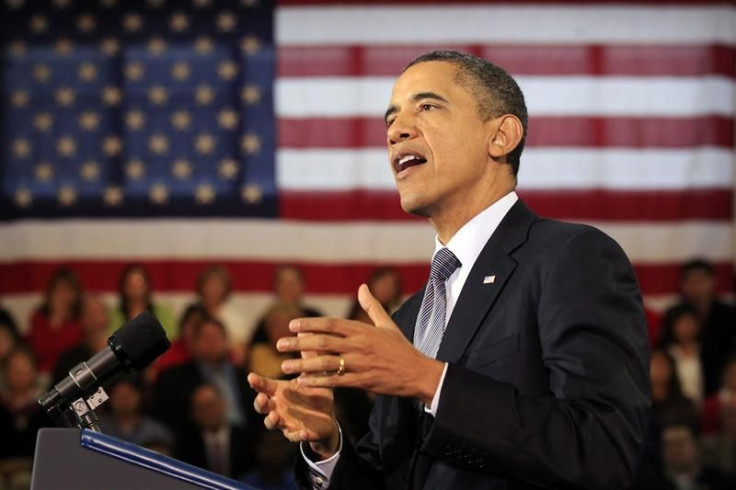Five Factors That Could Cost Obama the 2012 Election
OPINION

It goes without saying that if the 2012 presidential election was held today, in mid-December 2011, it would be a close contest.
The latest Gallup Poll has President Barack Obama tied at 47 percent to 47 percent with possible Republican Party presidential nominee Mitt Romney. Meanwhile, a Quinnipiac Poll shows Obama with just a slight 46 percent to 44 percent over Newt Gingrich, another possible GOP nominee.
Two qualifiers to the above. First, we are a long way from the November 2012 election: as they say inside the beltway, a year a life time in politics. Conditions -- in particular short-term issues pertaining to the election -- could change substantially in the next 11 months.
Second, President Obama does have the bully pulpit -- the incumbency advantage that stems from the White House's spotlight and megaphone. It's much easier for the White House to attract media coverage than candidates seeking the office.
That said, if one or a couple factors break against the president, the Republicans could recapture the executive branch in 2012.
And here are those factors, from least to most important:
1 The wrong V.P. Political science research tells us that the vote for U.S. president is a top only vote -- voters don't include the vice presidential candidate in their voting equation.
That said, a V.P. can sway a state -- usually his/her home state, and perhaps one or two others. There's talk that Obama may ask Vice President Joe Biden, D-Del., to step aside, possibly adding U.S. Secretary of State Hillary Clinton to the ticket, but that may create a negative backlash in Delaware. To be sure, blue state Delaware is a small state (only three electoral votes) but Obama, low in the polls, cannot afford a blue state loss.
2 Campaign mishaps/mistakes. Given his low approval rating, the pressure is on Obama's 2012 Campaign managers to run a tight, error-free campaign, with a specific, succinct message.
More than one presidency-in-the-making was ruined by a poor campaign -- former Vice President Al Gore, D-Tennessee's 2000 presidential campaign is perhaps the most notorious example, and painful one for Democrats. Gore's huge error: Not deploying the very popular President Bill Clinton on the campaign throughout; had he done so, Gore, not George W. Bush, would have become our nation's 43rd president.
3 Youth vote disillusionment and voting district intimidation. America's young adults, ages 18-30, turned-out big-time in support of Obama in 2008, as he epitomized the younger, postmodern, cool American candidate. Again, Obama needs 20-somethings to break for him en masse to win in 2012.
Similarly, turnout by African-Americans and Hispanic-Americans, and in particular, by the working poor, was strong in 2008, and there is concern that selected districts and/or groups may attempt to intimidate these Americans to prevent them from going to the polls.
Simply, every Democratic, community organization must be mobilized to ensure that every American is able to exercise his/her U.S. Constitution-protected right to vote. If anything less occurs, it will hurt Obama.
4. Alienated liberals. Again, simply, this is another must-have for Obama. Liberals must turn out and donate to Obama in a major way to balance the onslaught of deep-pocketed, motivated conservatives bent on re-creating the Bush presidency or the United States of America circa 1900. Any campaign fund doldrums will depress the Democratic vote -- and that would spell bad news for Democrats.
5. U.S. job growth. Finally, and most importantly, President Obama, and fellow Democrats have to implement policies that create jobs -- minimally 150,000-175,000 per month. Ideally: more than 200,000 per month to substantially lower the very high 8.6 percent U.S. unemployment rate. The U.S. economy has strengthened in the last three months, with job creation averaging about 130,000 new jobs per month for September, October, and November, but even larger job growth is needed to convince Americans, particularly Independent voters, that the economic recovery is sustainable, the unemployment problem is being solved, and the nation is on the correct course, economically.
Simply, if robust job growth does not return, it's likely that Obama will lose the 2012 election. There is a strong correlation between the unemployment rate and the vote for president. If the unemployment rate is rising, that's bad news for the incumbent; if it's falling, that's good news.
Further, it doesn't matter that the recession started before President Obama took the oath of office. The rule of the U.S. presidency is: after you enter the White House, any existing national problem becomes your problem.
Hence, keep an eye on job growth: barring an international crisis, it will be the most important issue in the 2012 campaign.
The Good News
The good news for Obama is that the election is not today: it's 11 months from today, in November 2012.
But Obama needs to get it in gear regarding job growth, now.
- -
© Copyright IBTimes 2024. All rights reserved.





















